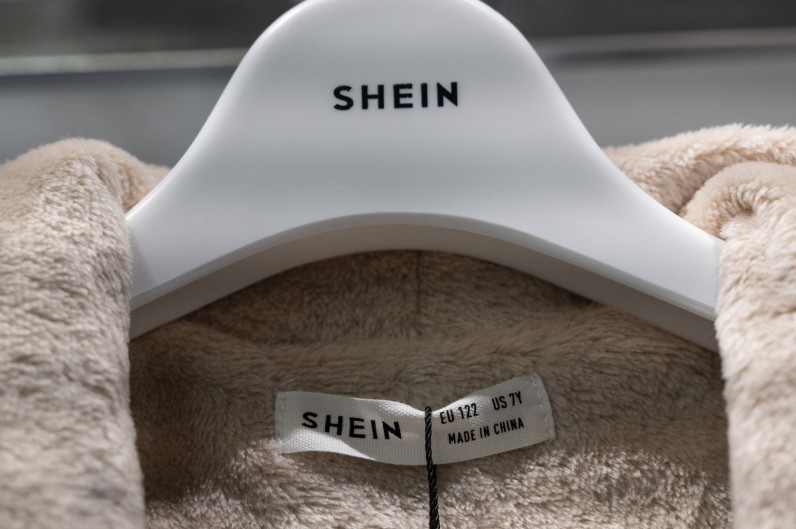Shein workers earn around $160 a month, working 75-hour weeks for $7 dresses.
JAPAN-CHINA-ECONOMY-RETAIL-SHEIN This photo taken on November 10, 2022 shows the Shein logo on a coat hanger and label during a media preview of the first permanent showroom of Chinese online fast fashion giant Shein in Tokyo. RICHARD A. BROOKS/AFP via Getty Images
Shein has not just toppled huge brands in the fashion industry with cheap clothes, it also amassed mass support to cover up its “inhumane” factories in China.
Located in Guangzhou, the Shein Village makes workers work very long hours to make t-shirts, dresses, and more items to be shipped worldwide.
According to a report by BBC, for all the very low prices, workers in the factories face severe conditions, often working up to 75 hours a week and having one day off every month. These conditions violate Chinese labor laws, which require fewer working hours and more regular rest days. That “fast fashion” speed comes at the expense of the workers’ welfare.
In the Panyu factories that form part of Guangzhou, workers rush to fulfill orders. They get paid per piece and are being paid as little as $1 for each product that they can make. Workers who come from the rural countryside work endless hours in bad conditions. Owners of factories feel all this pressure from Shein to sell goods at lower prices to fit within the company’s needs. More often than not, this brings low wages and barely a profit for the factories.
How Shein Sells You Cheap Clothes
Time Magazine explained that the company’s algorithm analyzes online data to predict which items are in demand, sending orders to the factories to ramp up production. This system, while effective for Shein, creates an unpredictable workload for the factories, which are forced to hire temporary workers to meet fluctuating demand. This perpetual cycle of production creates further stress for the workers who have to work till late in the night just to get their deadlines done.
Now, Shein is now getting ready for the possible IPO it will make to the public, VCPost earlier reported. In trying to balance out its reputation, Shein continues to make workers labor in the “Shein village,” putting in long hours.
Governments and several human rights groups increasingly put the company under intense scrutiny over allegations that the company sources cotton from China’s Xinjiang region, which is suspected to have cases of child and forced labor. Shein explained that it will strive to improve the working conditions of workers and increase the transparency of its supply chain. Yet the company has never responded directly to such concerns.


